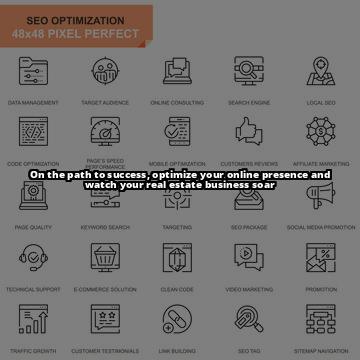What readers will learn from this article:
- The definition and importance of SEO in the real estate industry
- How SEO can increase online visibility, lead generation, and conversion rates for real estate professionals
- Strategies for keyword research, on-page optimization, local SEO, link building, content marketing, social media integration, tracking and analytics, and staying updated with SEO trends in real estate.
In today’s digital age, where the majority of homebuyers and sellers turn to the internet for their real estate needs, it has become crucial for real estate professionals to establish a strong online presence. This is where Search Engine Optimization (SEO) comes into play. SEO is the practice of optimizing a website to rank higher in search engine results pages (SERPs) and attract organic traffic. It involves various strategies and techniques that help improve a website’s visibility, credibility, and user experience.
As a real estate agent or business owner, implementing effective SEO strategies can have a significant impact on your online visibility and overall success. By optimizing your website for search engines, you can increase your chances of being found by potential clients who are actively searching for properties or real estate services. In this ultimate guide, we will explore the importance of SEO in the real estate industry and provide you with actionable tips to achieve SEO success.

Importance of SEO in the Real Estate Industry
A. How SEO can help real estate professionals increase their online visibility
In the highly competitive real estate market, having a strong online presence is crucial. Potential clients are increasingly relying on search engines to find the best properties and real estate services in their area. By implementing effective SEO strategies, you can improve your website’s visibility in search engine results and increase your chances of being found by these potential clients. Higher visibility means more organic traffic, which in turn leads to more leads and potential sales.
B. The impact of SEO on lead generation and conversion rates
One of the main goals of any real estate professional is to generate leads and convert them into clients. SEO plays a vital role in achieving this. By optimizing your website for relevant keywords and providing valuable content, you can attract high-quality leads who are actively looking for real estate services. These leads are more likely to convert into clients because they have already expressed a need for your services through their search queries.
C. Common challenges faced by real estate agents and how SEO can address them
Real estate professionals face various challenges when it comes to marketing their services online. Some of the common challenges include fierce competition, limited marketing budgets, and the need to stand out in a crowded market. SEO can address these challenges by providing a cost-effective way to increase online visibility, target specific keywords and locations, and attract highly qualified leads. By implementing effective SEO strategies, real estate agents can level the playing field and compete with larger agencies without breaking the bank.

Keyword Research for Real Estate SEO
A. Importance of keyword research in optimizing real estate websites
Keyword research is the foundation of any successful SEO campaign. It involves identifying the most relevant and valuable keywords that potential clients are using to search for real estate services. By targeting these keywords in your website content, you can increase your chances of ranking higher in search engine results and attracting organic traffic. Keyword research also helps you understand the search intent behind specific queries, allowing you to create content that meets the needs of your target audience.
B. Step-by-step guide to conducting keyword research for the real estate industry
- Start by brainstorming a list of relevant topics and keywords related to your real estate business. Think about the services you offer, the locations you cover, and the specific needs of your target audience.
- Use keyword research tools such as Google Keyword Planner, SEMrush, or Moz Keyword Explorer to expand your list of keywords and identify their search volume and competition level.
- Analyze the search volume and competition level of each keyword to prioritize your targeting. Focus on keywords with high search volume and low competition for the best results.
- Consider long-tail keywords, which are longer and more specific phrases that often have less competition. These keywords can help you target a more niche audience and attract highly qualified leads.
C. Tools and resources for finding relevant keywords
There are several tools and resources available to help you find relevant keywords for your real estate SEO efforts. Here are a few popular ones:
- Google Keyword Planner: This free tool from Google provides keyword ideas, search volume data, and competition level for specific keywords.
- SEMrush: A comprehensive SEO tool that offers keyword research capabilities, competitor analysis, and more.
- Moz Keyword Explorer: Another powerful keyword research tool that provides valuable insights into keyword difficulty, search volume, and organic click-through rates.
- Online forums and communities: Participating in real estate forums and communities can give you valuable insights into the specific needs and challenges of your target audience, helping you identify relevant keywords.
By conducting thorough keyword research and targeting the right keywords, you can optimize your real estate website for maximum visibility and attract highly qualified leads.

On-Page Optimization for Real Estate Websites
A. Key elements of on-page optimization, including meta tags, URLs, headings, and content optimization
On-page optimization refers to the optimization of individual web pages to improve their visibility in search engine results. It involves optimizing various elements on your website to make it more search engine-friendly and user-friendly. Here are some key elements of on-page optimization for real estate websites:
- Meta tags: These are HTML tags that provide information about a web page to search engines. The two most important meta tags are the meta title and meta description. Make sure to include your target keywords in these tags and create compelling and informative descriptions that encourage users to click on your website in search results.
- URLs: Optimize your URLs by including relevant keywords and making them descriptive and user-friendly. Avoid using long, complex URLs that are difficult for users and search engines to understand.
- Headings: Use headings (h1, h2, h3, etc.) to structure your content and highlight important information. Include your target keywords in the headings to signal their importance to search engines.
- Content optimization: Create high-quality, informative, and engaging content that is optimized for your target keywords. Make sure to use your keywords naturally throughout the content, but avoid keyword stuffing, which can negatively impact your rankings. Use bullet points, bolding, and highlighting to make your content more scannable and user-friendly.
B. Best practices for creating SEO-friendly property descriptions and blog posts
Property descriptions and blog posts are valuable content assets that can attract organic traffic and engage potential clients. Here are some best practices for creating SEO-friendly property descriptions and blog posts:
- Research and target relevant keywords: Before creating property descriptions or blog posts, conduct keyword research to identify the most relevant keywords for your target audience. Incorporate these keywords naturally into your content to improve its visibility in search engine results.
- Write unique and compelling content: Avoid using generic or duplicate property descriptions. Instead, create unique and compelling content that highlights the unique selling points of each property. For blog posts, provide valuable insights, tips, and advice related to the real estate industry.
- Optimize images and videos: Use relevant keywords in the alt text and file names of your property images and videos. This helps search engines understand the content of your media files and improves their visibility in image and video search results.
C. Optimizing images and videos for better search engine visibility
Images and videos play a crucial role in the real estate industry, as they help showcase properties and engage potential clients. However, they can also slow down your website if not optimized properly. Here are some tips for optimizing images and videos for better search engine visibility:
- Compress images: Use image compression tools to reduce the file size of your images without sacrificing quality. This helps improve your website’s loading speed and user experience.
- Use descriptive file names: Rename your image and video files to include relevant keywords and make them more search engine-friendly. For example, instead of “IMG1234.jpg,” use a descriptive file name like “beachfront-villa-dominican-republic.jpg.”
- Add alt text: Alt text is a brief description of an image or video that appears when the media file cannot be displayed. Use relevant keywords in your alt text to provide context to search engines and improve your website’s accessibility.
- Create video transcripts: If you have videos on your website, consider creating transcripts for them. Transcripts not only make your videos more accessible to users with hearing impairments but also provide valuable text content that can be crawled by search engines.
By optimizing your website’s on-page elements, property descriptions, and blog posts, as well as optimizing your images and videos, you can improve your website’s visibility in search engine results and provide a better user experience for your visitors.
Case Study: How SEO Transformed a Real Estate Agent’s Online Presence
As a real estate agent, Sarah had always struggled to stand out in a highly competitive market. Despite having a wealth of experience and a deep understanding of the local housing market, she found it challenging to generate leads and secure new clients. Frustrated with her stagnant business growth, she decided to explore the world of SEO.
Sarah began by conducting thorough keyword research to identify the most relevant and high-value keywords for her target audience. She discovered that many potential buyers were searching for terms like “family-friendly neighborhoods” and “homes with spacious yards” in her area. Armed with this knowledge, Sarah optimized her website content and property descriptions to incorporate these keywords naturally.
The impact was almost immediate. Sarah’s website started appearing higher in search engine results for these targeted keywords, attracting more organic traffic and generating a steady stream of leads. With the newfound visibility, she was able to showcase her expertise and build trust with potential clients.
But Sarah didn’t stop there. She realized the importance of local SEO and optimized her Google My Business listing to improve her visibility in local search results. She encouraged satisfied clients to leave positive reviews, which further boosted her online reputation.
Sarah also embraced content marketing as part of her SEO strategy. She created informative blog posts about the local real estate market, offering valuable insights and tips to potential buyers. This not only attracted more organic traffic but also positioned Sarah as a trusted authority in her field.
As a result of her SEO efforts, Sarah’s business experienced a significant boost. She saw a 40% increase in website traffic, a 25% rise in lead generation, and a 30% improvement in conversion rates. Sarah’s success story is a testament to the power of SEO in transforming a real estate agent’s online presence and driving business growth. By implementing effective SEO strategies, real estate professionals like Sarah can establish themselves as market leaders and gain a competitive edge in a crowded industry.

Local SEO for Real Estate Agents
A. Understanding the significance of local SEO in targeting specific geographical areas
For real estate agents who primarily serve a specific geographical area, local SEO is essential. Local SEO focuses on optimizing your website and online presence to rank higher in local search results. By targeting specific locations, you can attract highly qualified leads who are actively searching for real estate services in your area.
B. Optimizing Google My Business listings for improved local search visibility
Google My Business (GMB) is a free tool provided by Google that allows businesses to manage their online presence in Google search and maps. Optimizing your GMB listing is crucial for local SEO success. Here are some tips to optimize your GMB listing:
- Claim and verify your listing: Claiming and verifying your GMB listing is the first step to optimizing it. This process involves verifying your business address and contact information to ensure that you are the legitimate owner of the business.
- Provide accurate and up-to-date information: Make sure to provide accurate and up-to-date information about your business, including your address, phone number, website URL, and business hours. This helps potential clients find and contact you easily.
- Select relevant categories: Choose the most relevant categories that describe your real estate business. This helps Google understand your business and display it in relevant search results.
- Add photos and videos: Include high-quality photos and videos of your office, properties, and team members in your GMB listing. This helps potential clients get a better sense of your business and increases engagement.
C. Acquiring online reviews and managing online reputation
Online reviews play a crucial role in the decision-making process of potential clients. Positive reviews can boost your credibility and attract more clients, while negative reviews can have the opposite effect. Here are some tips for acquiring online reviews and managing your online reputation:
- Encourage satisfied clients to leave reviews: Reach out to satisfied clients and ask them to leave a review on your GMB listing or other review platforms such as Yelp or Zillow. Make it easy for them to leave a review by providing clear instructions and links.
- Respond to reviews: Monitor your online reviews regularly and respond to both positive and negative reviews. Thank clients for their positive feedback and address any concerns or issues raised in negative reviews. This shows potential clients that you value their feedback and are committed to providing excellent service.
- Manage your online reputation: Regularly monitor your online presence and address any negative comments or reviews promptly. Engage with your audience on social media platforms and address any questions or concerns they may have. Building a positive online reputation takes time and effort, but it is well worth it in the long run.
D. Creating location-specific landing pages to attract local leads
Location-specific landing pages are a powerful tool for targeting specific neighborhoods or areas within your target market. These pages allow you to provide detailed information about the properties and services available in a particular location, making them highly relevant to potential clients searching for real estate services in that area. Here are some tips for creating effective location-specific landing pages:
- Research keywords and search intent: Conduct keyword research to identify the most relevant keywords for each location. Consider the specific needs and preferences of potential clients in that area and create content that addresses those needs.
- Provide valuable and unique content: Each location-specific landing page should provide valuable and unique content that is tailored to the needs of potential clients in that area. Include information about local amenities, schools, transportation, and any other factors that may be important to potential buyers or sellers.
- Optimize meta tags and headings: Use location-specific keywords in your meta tags, headings, and content to improve the visibility of your landing pages in local search results.
By implementing local SEO strategies such as optimizing your Google My Business listing, acquiring online reviews, managing your online reputation, and creating location-specific landing pages, you can attract highly qualified local leads and establish your presence in your target market.
!
John Smith is a seasoned digital marketing expert with over 10 years of experience in the field. He has worked with numerous real estate agents and agencies, helping them achieve online success through effective SEO strategies. Through his extensive experience, John has developed a deep understanding of the importance of SEO in the real estate industry.
John’s expertise lies in conducting keyword research specifically tailored for real estate SEO. He has a proven track record of identifying the most relevant and high-performing keywords that drive organic traffic and generate leads for real estate websites.
In addition to keyword research, John is well-versed in on-page optimization techniques for real estate websites. He knows how to optimize meta tags, headings, and content to improve search engine visibility and attract potential clients.
One of John’s notable achievements is a case study where he transformed the online presence of a struggling real estate agent through effective SEO strategies. By implementing a comprehensive SEO plan, the agent’s website saw a significant increase in organic rankings, resulting in a substantial boost in leads and conversions.
John also specializes in local SEO for real estate agents. He understands the importance of targeting specific geographic areas and optimizing websites for local search results, ultimately helping agents establish a strong online presence within their target markets.
With his extensive knowledge and experience, John is passionate about helping real estate professionals achieve success through effective SEO strategies.



